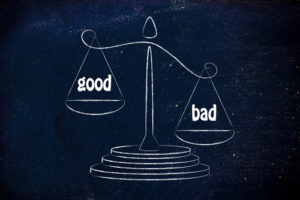Black and White Thinking: Good or Bad?
 I was talking to a client a few years back. She was feeling overwhelmed and stressed out. She said to me, “Everyone I know is in chaos right now.” Knowing how our thoughts can impact our emotional state, I asked her, “Is that really true? Everyone?”
I was talking to a client a few years back. She was feeling overwhelmed and stressed out. She said to me, “Everyone I know is in chaos right now.” Knowing how our thoughts can impact our emotional state, I asked her, “Is that really true? Everyone?”
She paused, running through her family and friends in her mind. “No, not everyone. Actually, just 5 people.” She let out a breath and started to relax.
Dichotomous thinking, sometimes called black and white thinking, is seeing things as all good or all bad. It lumps the whole world or an entire spectrum together in one big generalization, increasing our chances of feeling overwhelmed.
We miss the complexity and subtlety in situations because we can’t see multiple perspectives or allow that there might be more than one acceptable way of doing things. This can add pressure to our relationships.
It’s fairly common for all of us to do this once in a while, especially if we’re already feeling stressed, but for some people this thinking style is more pervasive. Unfortunately, dichotomous thinking can make us feel even more stressed out. A habit of dichotomous thinking has also been associated with depression and other mental illnesses.
These kinds of all-or-nothing thoughts are also associated with perfectionism, telling us that if we didn’t do it perfectly, it was a complete failure. It robs us from a sense of satisfaction with our life because it’s not possible to meet the expectations we set for ourselves and others. It can also keep us from even starting a project, because we’ve been told, “if you can’t do it right, don’t do it at all.”
There’s an old story about the farmer and his son. The farmer had a horse. One day when the son was trying to break the horse, he threw off the young man and he broke his arm. All the people in the town said to the farmer “this is terrible!” but the farmer shrugged his shoulders and replied “is it good or is it bad?”
Soon after this, some men from the army appeared in the town. They drafted all the young men who were able to fight. They didn’t take the farmer’s son because he had a broken arm. The people of the town exclaimed “you are so lucky that they didn’t take your son—it’s a good thing his arm was broken.” And the farmer replied “is it good or is it bad?”
Then the farmer’s horse got out of the field and ran away. The people said “this is awful news” but the farmer replied “is it good or is it bad?”
The next day the farmer’s horse returned—and brought several other wild horses with him. The townspeople remarked “you are so lucky! This is great!” And the farmer simply said “is it good or is it bad?”
 There are very, very few events in our lives that are inherently good or bad. When we look back at even the most challenging of times in our life – events we would never have chosen – this is often when significant growth happens. Gifts can ultimately come from dire circumstances. Judging things as good or bad oversimplifies our experiences.
There are very, very few events in our lives that are inherently good or bad. When we look back at even the most challenging of times in our life – events we would never have chosen – this is often when significant growth happens. Gifts can ultimately come from dire circumstances. Judging things as good or bad oversimplifies our experiences.
Given that black and white thinking skews our perception of reality and can take a toll on our health, relationships, and productivity, what can we do to catch it and change it?
We can think of dichotomous thinking as a habit of the mind. Like any habit, it can be changed over time when we put a conscious focus on it.
The first step is to notice what you’re saying to yourself – particularly when you’re feeling stressed. Be on the lookout for anything you might be saying to yourself or to other people with words like “everything,” “everyone,” “always,” “never,” or “nobody.” Even the words “good” or “bad” can signal that we’ve fallen into black and white thinking.
When you notice you’re making this kind of generalization or judgment, ask yourself, “Is that really true?” There isn’t much in our lives that is absolutely true all of the time or with all people.
Now ask yourself, “What might be more accurate?” See if you can be more specific. Challenge yourself to see from someone else’s perspective or come up with other ways of looking at a situation (even though you may not believe they’re “right”).
In some cases, this exercise can immediately help to lower your stress level. If dichotomous thinking is common for you, it will likely take some practice before you reap the full benefit. It’s within your power to choose to think differently – and feel better because of it.




